At Populus Group, we embrace the increasingly diverse world around us. Not only are we focused on hiring diverse talent, but we also ensure that once people join PG, we treat them with respect and support. We seek to embrace diversity and create conditions that provide everyone with an equal opportunity to thrive. This brings me to an exciting interview I had with one of our newer climbers, Josh Barlog! Josh wasn't born blind but developed full blindness over time and Populus Group is his first job working with this disability. I was able to slow down with Josh and talk with him about life, the different challenges he faces with blindness, and his overall experience at PG so far. Hope you enjoy this interview as much as I did!
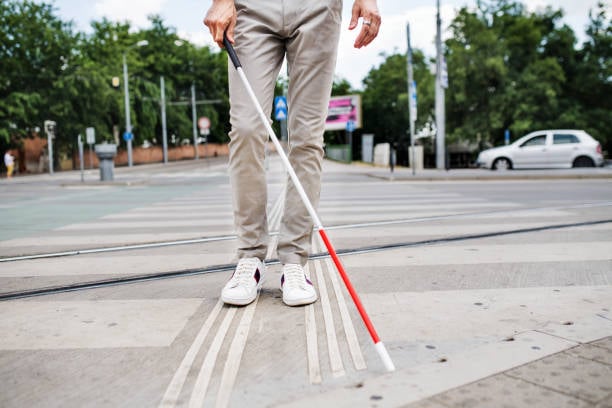
Tell me a little bit about yourself.
Well, I grew up in Romeoville, Illinois. My favorite food is tacos and pizza. I grew up playing baseball and basketball. I played pitcher and outfield in baseball and point guard in basketball. I played both sports throughout high school. After High School, I pursued a Bachelor’s in Broadcast Communication at North Central College and worked a million hours at the campus radio station, WONC-FM, an award-winning station. I won a personal award for "Best Station Promo" in New York City. This included audio recording and editing a 30-second spot that showcased our station.
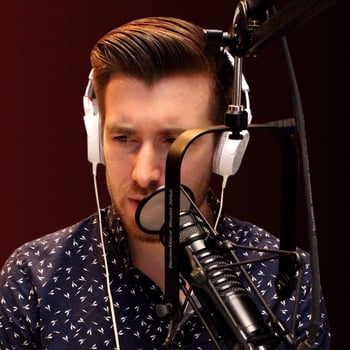
I was also part of a group of 3 broadcasters who won an AP Award (Associated Press) for broadcasting a tornado touching down live. One of my other interests is music! I play guitar and taught myself on YouTube in 2020 (this was after I couldn’t see, so I learned by listening to the videos).
I was born with a rare retinal disease called Familial Exudative Vitreal Retinopathy; people call it FEVR. This means my retinas were folded when I was born, which caused me to only see shadows. I went to a couple of different specialists and saw a specialist in Michigan to solidify the diagnosis and have the necessary surgeries in order to unfold the retinas and keep them attached. These surgeries took place in the first few months after I was born and gave me a pretty good functional vision. And that pretty much sums it up!
What was it like growing up with FEVR?
From the time I was four until I was 18, my vision was classified as 20/200. This means that if something is 200 feet away, I have to be within 20 feet away to see it the way that most people do. That’s a pretty big difference in proximity but I never really had any issues with clarity. It would just be a situation where I didn't even see that detail until I'm up close.
Regardless, I played competitive baseball and basketball until I was 18, and I went through school normally for the most part. The only thing I felt super different about is when everybody started driving. I was never able to drive, but the law in Illinois requires everyone to take Drivers Ed. So I did and got the highest grade in the class. No big deal. 😊
When did things begin to change for you?
When I was 18, I woke up one morning and couldn't see out of my left eye. It truly was an overnight type of situation, at least from what I noticed. When I saw my retinal specialist, he said the nature of the disease had activated in that eye. There are pressure units in your eye that are supposed to land between 10 and 21, and the pressure unit in my left eye was 55. The nature of the disease activates when the blood vessels overgrow, and when they overgrow, they start to leak fluid. Sometimes, if they overgrow too quickly, they don't just leak fluid, they burst. The blood vessels in my left eye had burst and ripped the retina totally off of the eye. Unfortunately, there was nothing they could do because it was completely detached.
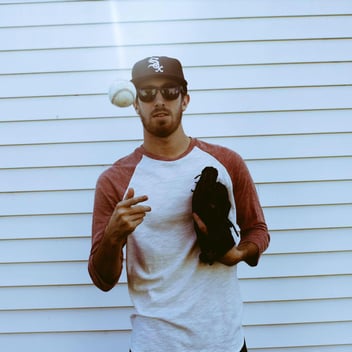 From then on, I went through life without vision in my left eye. When I was 25, I woke up and I was leaving my apartment to go to work. I tried to grab the door handle to leave, and I just straight up missed it, like, not close at all. I thought, “I don't know what's going on here, but whatever. Maybe I’m just tired or it’s the lack of coffee or something.”
From then on, I went through life without vision in my left eye. When I was 25, I woke up and I was leaving my apartment to go to work. I tried to grab the door handle to leave, and I just straight up missed it, like, not close at all. I thought, “I don't know what's going on here, but whatever. Maybe I’m just tired or it’s the lack of coffee or something.”
I got to the office, and somebody called my name. I tried to look over my shoulder and realized that I couldn't see out of the corner of my eye. And again, me being stubborn, I played it off. It wasn’t until later in the morning, when somebody called my name again and I tried to get up to walk over to their desk, that I slammed into a cubicle. I didn’t just bump into it, I football-tackled this thing. And I just thought, “Man, that was weird” and I just chalked it up to being clumsy… which I'm not, but then I turned around and did it again. At that point, one of our sales guys encouraged me to take the rest of the day off.
I went to my retinal specialist that same day and he said, “Hey, your retina is detaching and you need to have surgery”. Long story short, there are two types of retinal detachments. One is a physical detachment and the other is caused by fluid buildup. Mine was caused by fluid buildup, and there is no surgery. So, they medicated it, but the problem was I didn't notice any change in my vision for nine months. There was a fluid build-up in the retina and behind the eye for nine months before any sort of diagnosis or treatment. The medication started to work, but they had to do it slowly to stay away from the risk of other complications.
Ultimately, treating it slowly caused the fluid build-up to sit on the retina for so long that it just damaged the retina. I went from having decent vision in the left and the right eye to a loss of color perception at first, which was very weird. Then my distance started to go and then things started to get bright. From there, things started to just look washed out and it’s just diminished from there. I wouldn't say it's pitch black. If it's super bright, I can tell. Just the other day there was a really bright overcast here. And I told the person I was with, “hey, I can sort of see your outline a little bit”, you know, obviously no detail or color, but just a little bit, I could tell there's a figure there.
So that's the story. In fact, my role as a Recruiter at Populus Group is my first job being totally blind. For me, it’s just a continual journey.
What have been your biggest challenges since full blindness at age 25?
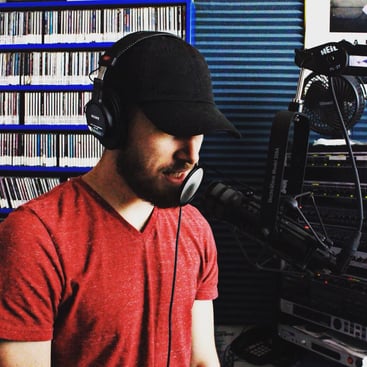
One big struggle was that I didn't use a cane for the first 2 years, which is like a very big no-no. It completely inhibits people from even walking around someone’s house. If someone said “Hey, let's go to the kitchen”, someone would need to get up and actually walk with me to the kitchen, or else I risk just slamming into things.
Another challenge is inaccessibility; technology is huge for me. Or people not necessarily totally understanding my disability. It’s easy for people to just say “Hey, there's a chair over here.” Yeah, cool. That doesn't really mean much to me, I need to know specifically, where is the chair?
Another funny tidbit, I had to change my wardrobe to just dark wash jeans. I only wear black, gray, and other neutral colors because I realized I'm not going to continuously try to figure out what colors are what. I'm just going to go super plain. So it’s saved me time in the morning. I don’t have to overthink it, as long as I have clothes on.
The other struggle I would say even now is large social gatherings. I'm comfortable moving around an unfamiliar area and just figuring it out, but I've realized that when you get up in front of people who aren't aware of your disability, they all stop what they're doing and just sit there and watch you. I think it's more of a “Hey, let's wait and see if he needs help or let's direct him somewhere”, but it does create an awkward feeling. I want to ask them, “Hey, why are you staring? I'm just getting up and going somewhere.”
People are also unpredictable in social gatherings, specifically in terms of their movements. I don't want to trip anybody or directly walk into somebody if they happen to be standing in an area that I may have missed with the cane. I also don’t want to bother people. I don't really have a problem asking for help, but when you can’t see what someone is currently doing, it makes it difficult. I don't want to take them away from a conversation or make them feel obligated to be available for me all the time. So, I think that's the biggest struggle at this point.
What does technology look like for you in the workplace?
There are a few different assistive technologies that exist, the most impactful for me is screen readers. For the computer that I use at PG, the best thing to have is JAWS, which is an acronym for “Job Access Workstation”. They're all screen readers. They all have different voices attached to them, as well as different functionalities. But JAWS is one of the most customizable and robust. It's absolutely an integral part of my day-to-day.
The way that screen readers like JAWS works are there’s basically a box or a cursor that roams around the screen and attaches itself to different elements - those elements could be plain text, images, etc. It could be buttons, form fields, or checkboxes. Whatever your mouse can click on or interact with, that's what's considered an element. I don't use the mouse pad; I only use the arrow keys and the tab key as it makes it easier for me to navigate through different elements. One of the places people spend the most time is in their email. Programs like Outlook and other commonly used applications are required to work with these screen readers to create and meet accessibility needs and remain compliant.
What are some things that you wish people understood more about blindness?
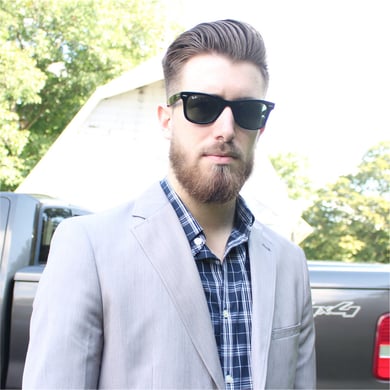
I think sometimes people perceive blindness as a cognitive disability. For example, I've been talked to slowly before, and it's not a good feeling. I understand that those disabilities exist, but just because I'm holding a white cane doesn't mean that I'm not intelligent. That's definitely something people should know… just talk to me like you talk to anybody else. I have similar interests. I’m a sports guy, I like music. I’m interested in all these things, and I just want to be treated like a person.
The other thing that I would truly say is to be as open to learning more about blindness and learning how life would be without your sight. As much as people don't want to think about it, going blind can literally happen to anybody. There is a heightened risk of retinal detachment if you have an elongated eye and I don't think people necessarily think about those things. The thought of "this could happen to me".
The other thing I really want people to better understand is sometimes there are things that are not possible with blindness. I mean, me being stubborn. I would rather sit there and almost destroy myself trying to figure something out than say “I know I asked you for help 4 seconds ago, but can you help me with this? And can you do this, this, and this?” So just being mindful of that. Open that door of communication and say, “Hey, I'm here. Let me know if you need help.” We don’t need to be coddled, but just offer and be open to assisting when necessary.
Lastly, something people should know is people with blindness need to be addressed directly. For example, if a bunch of people are at a round table, getting to know somebody, they ask “Hey, what do you like to do outside of work?” If you don’t say “Hey Josh, what do you do outside of work?” then I can't necessarily tell if your question is directed toward me, so I won’t answer. Just being addressed conversationally is so important. And tell me when you're leaving too. That’s happened to me before. I was standing next to somebody, and there was a small gap in the conversation… so I said, “Yeah, the pizza was pretty good.” And nobody was there. They walked away. These are things that you don't think about, like addressing somebody by their first name or letting them know when you leave during small talk.
How has PG impacted you so far?
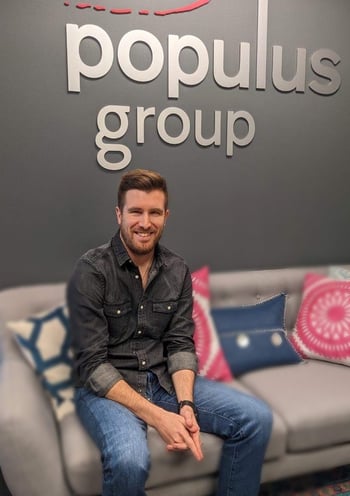 I’ve learned why we consider everybody here RP (Right Person) at Populus Group. My first day was wildly nerve-wracking because I'd only been into the building once and that was for an interview… I just had no clue what to expect. But the first couple of weeks, a lot of people kept getting up from their desks and showing me where things were and just taking time out of their day to make sure I was super comfortable.
I’ve learned why we consider everybody here RP (Right Person) at Populus Group. My first day was wildly nerve-wracking because I'd only been into the building once and that was for an interview… I just had no clue what to expect. But the first couple of weeks, a lot of people kept getting up from their desks and showing me where things were and just taking time out of their day to make sure I was super comfortable.
A specific example was at the new climber breakfast. We ordered bagels and Panera forgot to give us knives. A big shoutout to Brett Barkley. We were sitting in the conference room and I said, “Oh man, I don't have a knife to spread this cream cheese” and Brett said, “I got you. I'll be right back”. And I didn't know that he knew to do this (maybe it was just instinct), but he sat down, and he said “Here. I got the knife. It's to your left.” And he held it until I grabbed it. Because sometimes if you put something as light as a plastic knife on the table, and I go to grab it, I accidentally push it away and lose it. It was super refreshing to walk into an office where everybody was helpful and I heard things like, “How we can make it more comfortable?” or whatever the case may be. Overall, my experience has been really great.
That's a wrap! Thanks for sharing with us, Josh. We can't wait to see how your story affects other climbers and other communities alike!
If you’re reading this and you want to know more about blindness, educating yourself is the best way to start. Here are a few great resources:
- Myths vs. Reality of the Blind
- National Federation of the Blind (NFB) - Michigan
- Bureau of Services for Blind Persons (BSBP) - Michigan


 Populus Group
Populus Group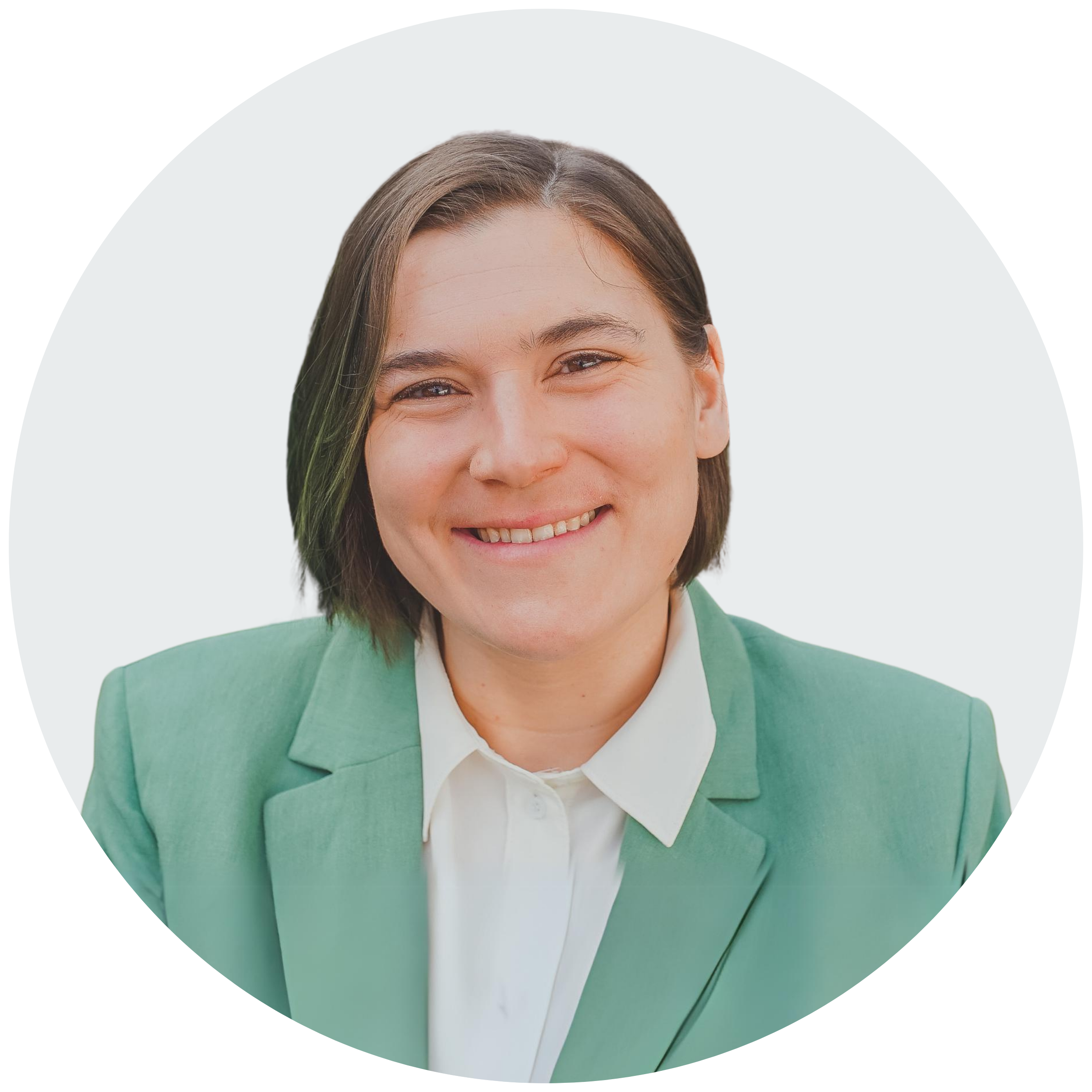 Ejay Oravecz
Ejay Oravecz
Leave a comment